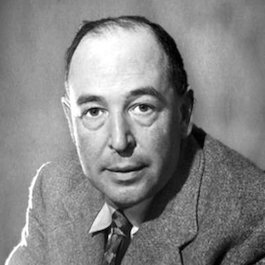C.S. Lewis on Pornography and Masturbation
- C.S. LEWIS
In "Mere Christianity" C.S. Lewis identified a factor in the astonishing growth of pornography.
Mere Christianity
 C. S. Lewis
C. S. Lewis1898-1961
"There is nothing to be ashamed of in enjoying your food: there would be everything to be ashamed of if half the world made food the main interest of their lives and spent their time looking at pictures of food and dribbling and smacking their lips…. We grow up surrounded by propaganda in favor of unchastity. There are people who want to keep our sex instinct inflamed in order to make money out of us. Because, of course, a man with an obsession is a man who has very little sales-resistance. God knows our situation; He will not judge us as if we had no difficulties to overcome."
The Weight of Glory
In The Weight of Glory he summarizes a man's battle with pornography.
"If we consider the unblushing promises of reward and the staggering nature of the rewards promised in the Gospels, it would seem that our Lord finds our desires, not too strong, but too weak. We are half-hearted creatures, fooling about with drink and sex and ambition when infinite joy is offered us, like an ignorant child who wants to go on making mud pies in a slum because he cannot imagine what is meant by the offer of a holiday at the sea. We are far too easily pleased.
"Lying on that study sofa…I had sensations which you can imagine. And at once I knew that the Enemy would take advantage of the vague longings and tendernesses to try and make me believe later on that he had the fulfillment that I really wanted. So I balked him by letting the longings go even deeper and turning my mind to the One, the real object of all desire, which (you know my view) is what we are really wanting in all wants… "
In some letters, Lewis writes:
"For me the real evil of masturbation would be that it takes an appetite which, in lawful use, leads the individual out of himself to complete (and correct) his own personality in that of another (and finally in children and even grandchildren) and turns it back; sends the man back into the prison of himself, there to keep a harem of imaginary brides.
"And this harem, once admitted, works against his ever getting out and really uniting with a real woman.
"For the harem is always accessible, always subservient, calls for no sacrifices or adjustments, and can be endowed with erotic and psychological attractions which no woman can rival.
"Among those shadowy brides he is always adored, always the perfect lover; no demand is made on his unselfishness, no mortification ever imposed on his vanity.
"In the end, they become merely the medium through which he increasingly adores himself…After all, almost the main work of life is to come out of our selves, out of the little dark prison we are all born in. Masturbation is to be avoided as all things are to be avoided which retard this process. The danger is that of coming to love the prison.
"The evidence seems to be that God sometimes works such a complete metamorphosis and sometimes not. We don’t know why: God forbid we should presume it went by merit.
"He never in my unmarried days did it for me. He gave me –- at least and after many ups and down, the power to resist the temptation so far as the act was concerned. Never did he stop the recurrent temptations, nor was I guarded from the sin of mental consent. I don't mean I wasn't given sufficient grace. I mean that I sometimes fell into it, grace or no…
"The great discovery for me was that the attack does not last forever. It is the devil's lie that the only escape from the tension is through yielding."
 This is J. Fraser Field, Founder of CERC. I hope you appreciated this piece. We curate these articles especially for believers like you.
This is J. Fraser Field, Founder of CERC. I hope you appreciated this piece. We curate these articles especially for believers like you.
Please show your appreciation by making a $3 donation. CERC is entirely reader supported.

Acknowledgement
C.S. Lewis. "C.S. Lewis on Pornography and Masturbation" various sources.
Published under a fair use provision.
The Author

 Clive Staples Lewis (1898-1963), commonly called C. S. Lewis was a novelist, poet, academic, medievalist, literary critic, essayist, lay theologian, and Christian apologist. Born in Belfast, Ireland, he held academic positions at both Oxford University (Magdalen College), 1925-1954, and Cambridge University (Magdalene College), 1954-1963. He is best known both for his fictional work, especially The Screwtape Letters, The Chronicles of Narnia, and The Space Trilogy, and for his non-fiction Christian apologetics, such as Surprised by Joy: The Shape of My Early Life, Mere Christianity, Miracles, The Weight of Glory, and The Problem of Pain.
Clive Staples Lewis (1898-1963), commonly called C. S. Lewis was a novelist, poet, academic, medievalist, literary critic, essayist, lay theologian, and Christian apologist. Born in Belfast, Ireland, he held academic positions at both Oxford University (Magdalen College), 1925-1954, and Cambridge University (Magdalene College), 1954-1963. He is best known both for his fictional work, especially The Screwtape Letters, The Chronicles of Narnia, and The Space Trilogy, and for his non-fiction Christian apologetics, such as Surprised by Joy: The Shape of My Early Life, Mere Christianity, Miracles, The Weight of Glory, and The Problem of Pain.


